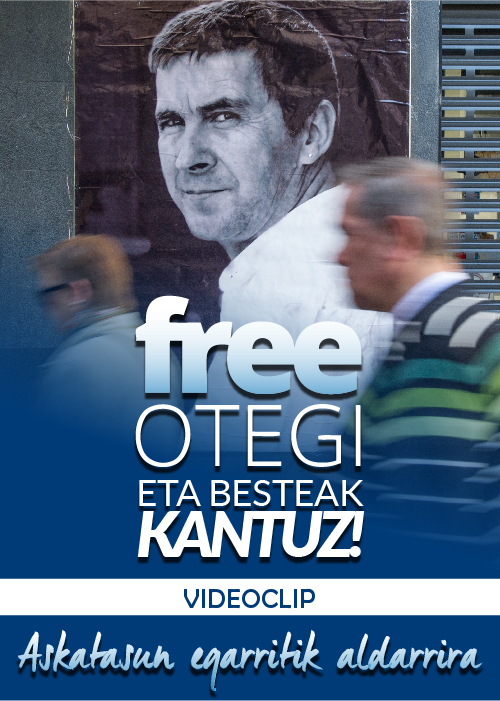Arnaldo Otegi was born on July 6, 1958 in Elgoibar, a small town in the Basque province of Gipuzkoa. He is married and father of two. He holds a University degree in philosophy and literature. He is the Secretary General of the pro-independence party, Sortu, and is currently held in the Prison of Logroño, under prisoner number 871900510.
Arnaldo Otegi grew up in a Basque language speaking family. The Basque language was prohibited by Franco’s regime, so his parents sent him to one of the secret Basque language schools. He got involved in the struggle for democratic rights and Basque independence at the age of 17, under Franco’s fascist regime. Arnaldo Otegi was forced to exile in France and at the beginning of the eighties was put in hands of Spanish authorities, tortured and sentenced accused of being a member of ETA.
After his release in 1993 he continued his political activism as a member of Herri Batasuna (People’s Union), a coalition of Basque pro-independence parties. In 1995 he became MP for Herri Batasuna (later Batasuna) in the parliament of the Basque Autonomous Community. After the arrest and imprisonment of the whole Mahai Nazionala (chief executive of Herri Batasuna) in 1997, Arnaldo Otegi became member and spokesperson of the new executive.
From 1998 on he took part in all the negotiation attempts to solve the conflict. He was in and out of jail with sentences connected to his political activism (in 2011 The European Court on Human Rights sentenced against Spain for having violated his free expression in convicting him for comments about Spanish King´s responsibilities as Head of the Army and the ongoing denounces of torture by detainees). He was part of the party negotiation team in the talks amongst Basque Parties, both in Loiola and Geneve during the 2005-2007 peace process.
Arnaldo Otegi was arrested just three days after the collapse of the process in June 2007 and sent to jail to serve sentence (until 2008) for an homage to Jose Miguel Ordeñana, Argala (a Basque exile during Franco´s regime killed by a Spanish Gov. death squad, called “Spanish-Basque Battalion”, in December 1978).
After his release from jail in August 2008 Otegi worked relentlessly with a small group of people (known now as the Bateragune 5) to get the pro-independence movement and key people within Basque society behind a renewed peace strategy.
He wasn’t allowed to leave the Spanish State but he nevertheless travelled to the Northern Basque Country (French State) where he met with historical and influential leaders of the Basque pro-independence movement to promote a new effort for peace.
On 13 October 2009 he was arrested again while preparing the new peace initiative. Spanish military police stormed the headquarters of Basque trade union LAB in Donostia, where Otegi and several members of the party leadership were preparing the debate process of their new peace proposal. More than 50.000 people took the street in Donostia to demand their release.
Despite their arrests, the proposal was distributed and started to circulate on the wider movement. From November 2009 on it was discussed in meetings by almost 10.000 activists and agreed as the new way forward. The core of this strategy is the unilateral commitment to exclusively peaceful means, to peacefully aim for Basque citizens’ and international support and to insist that all sides of the conflict accept the democratic will of the Basque people and put an end to violence. The new strategy endorsed the so called “Mitchell Principles” promoted by US Senator and diplomat Mr. George Mitchell during the Irish Peace Process.
On 17 September 2011, while the peace strategy unfolded, ETA held a verified ceasefire and soon before ETA announced the definitive cessation of its armed activity, just a few days after international mediators led by former UN secretary general Kofi Annan formally called on the group to lay down arms, the Spanish special court “Audiencia Nacional” sentenced him to 10 years imprisonment.
Despite this facts and the current situation, the court alleged that Otegi’s meetings where not about peace but about receiving orders from ETA. The Supreme Court reduced his sentence to 6 and half years, with a dissenting opinion demanding his release by Supreme Court Judge Barreiro who considered not being proved at all that Arnaldo Otegi was receiving orders but convincing ETA to end the armed campaign. The Constitutional Court ratified this decision in July 2014 on a much disputed decision when five from twelve Court Judges dissented asking his release. His legal counsel announced an appeal to the ECHR.
During Sortu’s constitution process early in 2013 (a new legal political party), he was elected as Sortu’s Secretary General, and the position has been left vacant while he is in prison. He should be released April 2016.
In 2013 he and the President of the PSE (Basque Socialist Party) Jesus Egiguren were honoured with the “Gernika Peace Award” for their contributions to a lasting peace in Basque Country.

